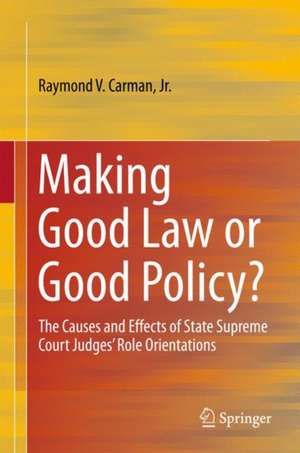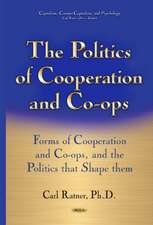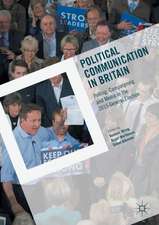Making Good Law or Good Policy?: The Causes and Effects of State Supreme Court Judges’ Role Orientations
Autor Raymond V. Carmanen Limba Engleză Hardback – 15 mar 2017
| Toate formatele și edițiile | Preț | Express |
|---|---|---|
| Paperback (1) | 520.30 lei 6-8 săpt. | |
| Springer International Publishing – 21 iul 2018 | 520.30 lei 6-8 săpt. | |
| Hardback (1) | 526.50 lei 6-8 săpt. | |
| Springer International Publishing – 15 mar 2017 | 526.50 lei 6-8 săpt. |
Preț: 526.50 lei
Preț vechi: 619.42 lei
-15% Nou
Puncte Express: 790
Preț estimativ în valută:
100.75€ • 107.73$ • 83.100£
100.75€ • 107.73$ • 83.100£
Carte tipărită la comandă
Livrare economică 18 aprilie-02 mai
Preluare comenzi: 021 569.72.76
Specificații
ISBN-13: 9783319533803
ISBN-10: 3319533800
Pagini: 146
Ilustrații: VIII, 140 p. 4 illus.
Dimensiuni: 155 x 235 x 10 mm
Greutate: 0.39 kg
Ediția:1st ed. 2017
Editura: Springer International Publishing
Colecția Springer
Locul publicării:Cham, Switzerland
ISBN-10: 3319533800
Pagini: 146
Ilustrații: VIII, 140 p. 4 illus.
Dimensiuni: 155 x 235 x 10 mm
Greutate: 0.39 kg
Ediția:1st ed. 2017
Editura: Springer International Publishing
Colecția Springer
Locul publicării:Cham, Switzerland
Cuprins
1. An Empirical Puzzle.- 2. Role Theoretic Literature and a Judicial Role Theoretic Framework.- 3. Survey Design and Survey Results.- 4. Determining the Causes of Role Orientation.- 5. Role Orientation's Effect on Role Behavior.- 6. Conclusion.
Notă biografică
Raymond V. Carman, Jr. is an Assistant Professor in the Department of Political Science at the State University of New York, College at Plattsburgh, where he has been a faculty member since 2014. Ray completed his Ph.D. at Binghamton University and his undergraduate studies at Niagara University. His research and teaching interests include: American political institutions (including courts, federalism, intergovernmental relations, and state politics); judicial behavior and politics (including judicial decision-making, judicial selection, and the psychology of judging); law (including civil rights and liberties, and constitutional law); and research methods.
Textul de pe ultima copertă
This book uses role theory to analyze the judicial decisions made by state supreme court judges. Grounded in the fields of anthropology, business management, psychology, and sociology, role theory holds that, for each position an individual occupies in society, he or she creates a role orientation, or a belief about the limits of proper behavior. Judicial role orientation is conceptualized as the stimuli that a judge feels can legitimately be allowed to influence his or her decision-making and, in the case of conflict among influences, what priorities to assign to different decisional criteria. This role orientation is generally seen as existing on a spectrum ranging from activist to restraintist. Using multi-faceted data collection and empirical testing, this book discusses the variation in judges’ role orientations, the role that personal institutional structure and judges' backgrounds play in determining judicial orientations, and the degree to which judges’ orientations affect their decision-making. The first study to provide cross-institutional research on state supreme court judges, this book expands and advances the literature on judicial role orientation. As such, this book will be of interest to graduate students and researchers studying political science, public policy, law, and the courts.
Caracteristici
Provides a theoretically-grounded and empirically-tested examination of the effect that judges' role orientations have on their decision-making Analyzes the results of a nationwide survey of the entire population of state supreme court judges Presents the first cross-institutional examination of the role orientations of state supreme court judges Includes supplementary material: sn.pub/extras









